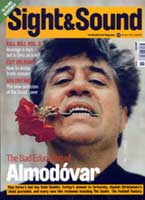
June 2004
Please view our back issues page for more information about obtaining previous months issues, dating back to 1995.
Features
 Day Of The Woman
Day Of The Woman
Forget the fan-boy in-jokes, Kill Bill Vol. 2 is actually a radical remapping of traditional family values with nods to the Oedipal myth, female-centred horror movies and the Old Testament. B. Ruby Rich is besotted.
 Embezzler Of Hearts
Embezzler Of Hearts
In the first of a new series on actors, David Robinson gets beneath the beautiful skin of Rudolph Valentino and explains why he was among the greatest of screen icons.
All I Desire
Bad Education marks a further maturing of Pedro Almodovar's style with its spidery plot and elegant mise en scène. And this deeply felt autobiographical work has struck a chord with Spanish audiences. Paul Julian Smith is impressed.
A Silky Sadness
Uzak is the final instalment in a trilogy of films by Turkish director Nuri Bilge Ceylan. Jonathan Romney applauds the intensely personal cinema of this new arthouse star.
Necessary Illusions
When the Iranian authorities banned his latest film, Babak Payami fled the country with a copy. He talks to Sight & Sound about what cinema means to Iran's secret police. Plus Jafar Panahi tells Mark Irving about the A-C of censorship.
The Temple On The Lake Within
Kim Ki-Duk's Spring, Summer, Autumn, Winter... and Spring is a sumptuous meditation on rage and redemption. He talks to Leslie Felperin about the film's imagery.
Protect and Survive
Like Kiss of the Spider Woman, Hector Babenco's Carandiru is set in a Brazilian prison. But this time he plays it for real, he tells Ali Jaafar.
Selected reviews
 Film of the Month: Shattered Glass
Film of the Month: Shattered Glass
Shattered Glass shows how a journalist's deceptions shook the reputation of a US magazine. But how can we tell truth from lies, asks Edward Lawrenson.
Reviews in this issue:
- Agent Cody Banks Destination London
- The Agronomist
- Anazapta
- Bad Education
- Battle Royale 2 Requiem
- Bon Voyage
- Bukowski Born into This
- The Calcium Kid
- Confessions of a Teenage Drama Queen
- The Cooler
- Emile
- Festival Express
- The Football Factory
- Freeze Frame
- Fubar
- The Grudge (Ju-On)
- Japanese Story
- Joy of Madness
- Kill Bill Vol. 2
- Married/Unmarried
- Merci Docteur Rey
- Re-inventing Eddie
- Film of the Month: Shattered Glass
- Since Otar Left
- Spring, Summer, Autumn, Winter and... Spring
- Stoked The Rise and Fall of Gator
- Uzak

 Bad Education
Bad Education Spring, Summer, Autumn, Winter and... Spring
Spring, Summer, Autumn, Winter and... Spring